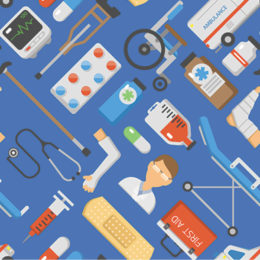The following is an update to a blog post written by Shannon Beebe, Manager of Healthcare Operations.
Social Determinants of Health (SDoH) play a very important role in health outcomes of patients of all ages. The ability to influence social determinants largely falls outside of the healthcare system’s reach. Therefore, a key to address opportunities for health involves collaboration between health care and different industries such as education, housing, and transportation. As a healthcare consulting firm, RMS understands the significance of addressing SDoH as a priority with our clients. We feel this is an important topic to share.
What Do We Know About SDoH?
The Centers for Disease Control and Prevention (CDC) defines SDoH as conditions in the places where people live, learn, work, and play. All of these factors affect a wide range of health risks and outcomes. We know that individuals who live in poverty have limited access to healthy foods, such as fresh fruits and vegetables. We also know that communities with unstable housing, high crime, and substandard educational resources tend to have poor health outcomes.
What Does the Research Say?
Research shows that 80% of patient health outcomes can be influenced by non-medical factors1. Therefore, assessing SDoH is not enough. Once assessed, our primary care practices must have the resources to address the social determinants that are affecting their patients. In 2017, the New York State Department of Health (NYS DOH) announced the formation of the Bureau of Social Determinants of Health. The goal of this program is to address social determinants utilizing a value-based payment (VBP) model of care. The VBP SDoH subcommittee created an intervention menu tool and recommendations to supply providers with evidence-based interventions that aim to improve SDoH. Our challenge is implementing these strategies at the practice level and improving health outcomes for all patients.
What Do We Do?
By applying what we already know about SDoH and how they affect individuals in our community, we can not only improve the individuals and population health but can also improve health equity. Healthy People 2020 highlights health equity and equal access to healthcare for all populations.
The first step in addressing SDoH is to assess the needs of your patients. This can be done in a variety of different ways. Screening for SDoH can help identify needs of an individual. The first step is to screen for the 5-core health-related social needs, which according to the American Academy of Family Physicians (AAFP) include housing, food, transportation, utilities (gas, electric), and personal safety. Once you have this information, you can provide the individual with the resources to address their unique needs.
The most evident SDoH is transportation. Whether a patient lives in an urban or rural community, transportation is a significant barrier to their healthcare. Several healthcare organizations have focused on this area to improve health outcomes for their most vulnerable patients. Staff take action by setting up and confirming transportation for these patients, as well as contacting the patient to remind them of their appointment and pick-up time. Practice staff also monitor no-shows for these patients and analyze whether they missed their appointment due to transportation issues or something else. This allows the practice to see the “whole picture” and help the patient prioritize their needs.
How We Can Help
RMS Healthcare, a division of Research and Marketing Strategies, Inc. (RMS), is a leading Healthcare consultant, providing strategic operational support, consulting, and research services—tailoring our expertise to optimize your organization’s performance. Our team brings years of experience in working with clients to improve health outcomes for their patients, as well as working with vulnerable populations through community-based organizations. We understand what SDoH are and how they impact health outcomes. In many instances, the SDoH must be met first, before the patient can address their medical needs. We also understand how important these issues are to your patient workflow and process to help you ensure that you are operating in the most efficient and effective way. Assessing and addressing SDoH may also improve response rates for patient satisfaction surveys to ensure that you are capturing experience data for all of your patients.
For more information on how we can help your organization, please contact Susan Maxsween, Vice President of Healthcare Operations & Consulting, at SusanM@RMSresults.com or reach her by phone at 1-866-567-5422.
1 https://www.himss.org/news/social-determinants-of-health-data-to-improve-patient-care

